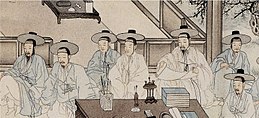| This article relies largely or entirely on a single source. Relevant discussion may be found on the talk page. Please help improve this article by introducing citations to additional sources. Find sources: "Korean flower arrangement" – news · newspapers · books · scholar · JSTOR (July 2024) |
 |
| Part of a series on the |
| Culture of Korea |
|---|
| Society |
| Arts and literature |
| Other |
| Symbols |
|
Korean flower arrangement is an indoor art, and most often uses simple Joseon dynasty whiteware to highlight Korean flowers and tree branches in elegant and unforced natural arrangements. Im Wha-Kong of Ewha Woman's University in Seoul, who also makes her own ceramic wares, is considered one of the greatest living developers of this art, and hosts quarterly displays of flower arrangements. There are at least a dozen schools of traditional flower arrangements, and the art is considered to be in revival.
Introduction
Formal flower arrangements were closely allied to the development of the Korean tea ceremony, and suggestions have been made that these were often corner-of-the-room arrangements on small tables using a central vessel with most often a small branch and a small group of local flowers. Sprigs of pear blossoms were particularly well known, and during the winters ever-green sprigs that would have enhanced celadon ware, or given a cool elegance to whiteware were used.
Leaves, blossoms, ferns, and grasses were also used.
Arrangements were primarily done by women in tea-houses and in the greater houses. Confucian male masters may have done this as well.
History
This floral art was not documented before the 14th century as a distinct art. Votive altar arrangements of flowers for Buddhist temples were precursors. But it was under Confucian hands, in Joseon Yi dynasty times, that arrangements can be said definitely to have begun and were known, and included in illustrations by artists of that time.
See also
References
- "Oriental Flower Arrangement" in three volumes and "Oriental Flower Arrangement 100" in four volumes by Im Wha-Kong, Seoul, 1995
- "Korean Flower Arranging". koreatimes. 2008-10-14. Retrieved 2024-07-01.
- "Welcome To Korea Now !!!-Society & The Arts". 2005-04-16. Archived from the original on 2005-04-16. Retrieved 2024-07-01.